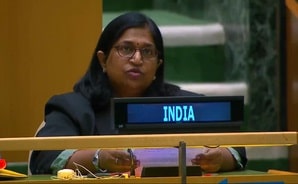Failing to adopt measures for Security Council reforms at its current session, the UN General Assembly on Tuesday decided unanimously to push the negotiations to the next, a move India decried as risking the process's legitimacy.
The negotiation process, known as the Inter-Governmental Negotiations (IGN), "risks losing legitimacy if it continues indefinitely" without producing a tangible result, Yojana Patel, India’s Deputy Permanent Representative, told the Assembly after it voted the rollover to the session that begins next month.
Calling the IGN’s failure to adopt a negotiating text to meaningfully move the discussions forward "untenable", she said: "It is clear that progress in this process continues to be incremental at best, and far from what most delegations aim for given the importance and urgency of this issue."
Year after year since the start of the IGN process in 2009, the Assembly has kept pushing the negotiations to the next session. It could not start formal negotiations because of opposition from some countries to the adoption of a formal negotiating text, which India has demanded. This is mainly because a group of 12 countries calling themselves Uniting for Consensus led by Italy and including Pakistan and Canada have used procedural gambits to block it from adopting a negotiating text.
"This ongoing exercise aimed at expanding convergences appears to have run its course, and in contributing to any meaningful progress, urgent text-based negotiations are the need of the hour," Patel said. She also questioned the acceptability of the text about the Council reforms contributed by the IGN co-chairs for inclusion in the Pact of the Future to be adopted at the Summit of the Future (SOTF) next month to chart the UN’s course as it turns 80 next year.
"Finalised without due negotiations", it "does not accurately reflect the sentiment of the member states", she said.
Patel also criticised the “Elements Paper” prepared by IGN co-chairs, Permanent Representatives Tareq Albanai of Kuwait and Alexander Marschik of Austria, summarising the progress of the negotiations in the current session and to be the basis for continuing it. She said it was a "subjective summary", riddled with contradictions and "inaccurate and misleading" because, for example, it gives the impression that there is convergence among regional groups while also admitting in a footnote that there was no consensus.
Speaking on behalf of the G4 - India, Brazil, Germany, and Japan which together push for reform and mutually support their permanent memberships in a reformed Council – Brazil’s Permanent Representative Sergio Danese warned that if the negotiations fail to move forward," it might be inevitable to conclude that the IGN framework is irreversibly unfit, or worse, that it is an impediment to reform".
"In this case", he said, "the member states will demand for novel ways and strategies".
But he added a note of optimism saying: "It is promising to see a growing consensus within the United Nations on the need for urgent reform".
Secretary-General Antonio Guterres "very much hopes that member states, in their wisdom, will bring the process of Security Council reform to a result", his Spokesperson Stephane Dujarric said after the vote. Guterres "has been extremely vocal, especially lately, on the need for reform, notably on the need to find a [permanent] seat for an African country on the Security Council," he added,


Tripura Govt contemplating to boost tourism: Minister Sushanta Chowdhury
The state transport and tourism minister Sushanta Chowdhury on Thursday said that the government is contemplating to make tourism as an alternate means of livelihood in the state. Adequate fund has been allocated for further developing the tourism sector, he added.
Imports from B’desh to Tripura increase, exports largely decline: Minister
Imports from Bangladesh into Tripura increased but exports from the northeastern state of India to the neighbouring country substantially declined, state Industries and Commerce Minister Santana Chakma told the Assembly on Thursday.
67 percent households in AMC areas connected with drinking water supply: CM Dr Manik Saha
Chief Minister Dr Manik Saha on Thursday claimed that at least 67% households were connected with drinking water supply in the areas of Agartala Municipal Corporation.
Boy drowns in Muhuri River during Baruni bathing ritual
In a tragic incident, Sayan Pal (18), a 12th-standard student from Arya Colony, Belonia, drowned in the Muhuri River while participating in the holy Baruni bathing ritual on Wednesday afternoon.
Innovative projects launched to supply drinking water from Dumbur: CM
Chief Minister Prof. Dr. Manik Saha today said that several innovative projects have been set up based on the reserved water of the Dumbur water reservoir, making it possible to provide drinking water connections to many families through pipelines.
Govt undertaken measures to increase Howrah river’s navigability: Tripura CM
Chief Minister Prof. Dr. Manik Saha today said that the state government has undertaken a series of measures to permanently address flooding in Agartala city by increasing the navigability of the Howrah River.
Tripura Assembly witnesses spat over minister's 'racist' remark against LoP
The Tripura Assembly witnessed a noisy scene for the fourth day on Thursday over Parliamentary Affairs Minister Ratan Lal Nath's alleged racist remarks against Leader of the Opposition (LoP) Jitendra Chaudhury.
Centre Releases Rs 240.5 Crore to Tripura for Urban Planning Reforms
Chief Minister Prof. Dr. Manik Saha today announced that the Ministry of Finance has released Rs 240.5 crores to Tripura for achieving urban planning reforms.